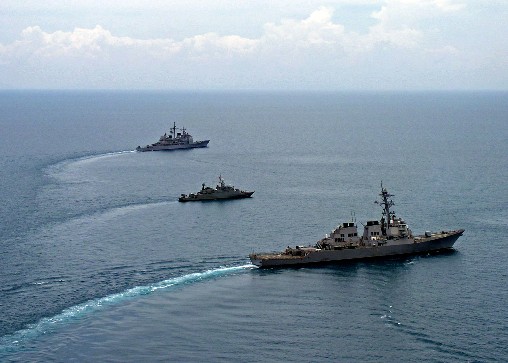 Image courtesy of U.S. Navy
Image courtesy of U.S. Navy
The Law of the Sea Needs U.S. Legitimacy
After years of maritime disputes between China and its neighbors over the South China Sea, The Hague’s Permanent Court of Arbitration (PCA) ruled in favor of the Philippines in The South China Sea Arbitration on July 12, 2016. In its decision, based on the United Nations Convention on the Law of the Sea (UNCLOS), the tribunal determined that China has no legal basis “to claim historic rights to resources within the sea areas falling within the ‘nine-dash line’.” Despite a victorious ruling for the Philippines, it will not be smooth sailing moving forward, especially if the United States fails to ratify the Law of the Sea.
Although China ratified UNCLOS in 1996, it has refused to participate in the case from the very beginning, when the Philippines filed it with the United Nations in January of 2013. Nevertheless, Annex VII of UNCLOS states that the, “absence of a party or failure of a party to defend its case shall not constitute a bar to the proceeding.” As such, the PCA moved forward with the case. In response, Chinese President Xi Jinping quickly rejected the decision, raising tensions in the South China Sea.
China’s presence in the South China Sea has not only impacted the Philippines. As suggested by the lawyers who argued the case, China’s nine-dash line, “is equally invalid to [neighboring] States and, indeed, the rest of the international community,” referring to Malaysia, Vietnam and Indonesia. Multiple countries, including Vietnam and Japan – a key U.S. ally – have voiced strong support of the ruling. In their statement, Japan voiced its expectation that, “the parties’ compliance with this ruling will eventually lead to the peaceful settlement of disputes in the South China Sea.”
The U.S. has expressed a similar sense of hope and expectation that both China and the Philippines comply with the decision, urging both parties to avoid any provocative action that could escalate the situation. However, the U.S. is not one of the 168 nations that have ratified UNCLOS. In addition to hindering the credibility of the convention, the lack of U.S. ratification undermines the country’s involvement in the South China Sea disputes.
Treaties and conventions are a collection of agreements that are detailed by the participating states, with the expectation that said states will follow them. Thus, international law provides a global order and ensures states’ national interests by creating a system for states to settle disputes peacefully. Nevertheless, it requires active participation. A state’s altruism and enlightened self-interest is not sufficient to maintain the global order. Instead, it requires a balanced alignment of interest and power to create a credible way of resolving disputes.
Accordingly, the United States, one of the world’s largest powers, should ratify the Law of the Sea to help bolster the credibility of the treaty. Doing so will further pressure China to abide to the tribunal’s decision. If the South China Sea case is not enough reason to ratify UNCLOS, the U.S. must be prepared to face the maritime disputes that will arise from an ice-free Arctic ocean by 2050.
As the new ocean emerges, the U.S. must be prepared to arrive at an agreement with its Arctic neighbors, including Russia; Russia ratified UNCLOS in 1997. UNCLOS will provide a framework and common understanding of each nation’s right to claim its authority over the space. In order to maintain American power and credibility as the case arises, it is essential for the U.S. Senate to ratify UNCLOS. Ratification of UNCLOS will allow the U.S. to build a bridge over troubled waters.





